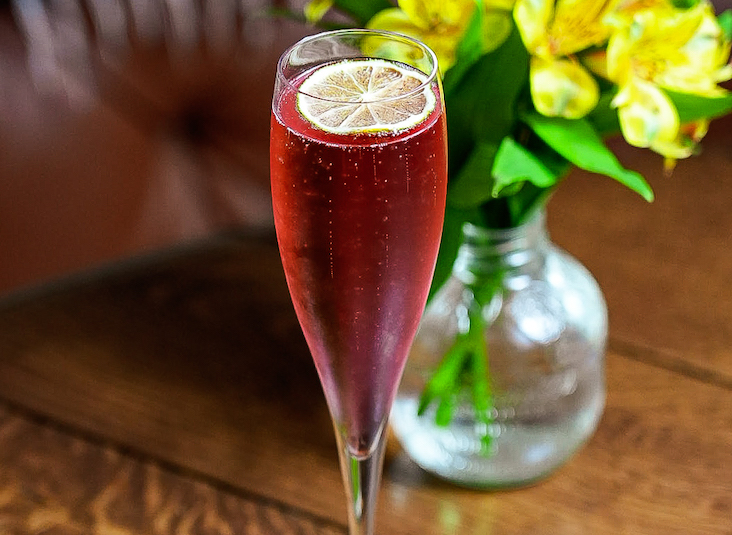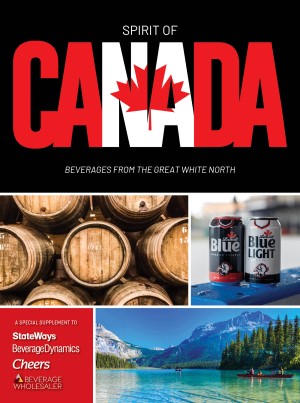Leading Adult Beverage Event Back in New Orleans in 2006
CONFERENCE COVERAGE BY ELEANOR VAN SAVAGE AND JACK ROBERTIELLO
Years of steady growth has meant mostly good things for the on-premise beverage industry, but the success has bred its own concerns, like beverage alcohol service liability, how to manage the boom of new premium and super-premium products, what the next signature beverages will be and how to make them: all issues for the eighth annual Cheers Beverage Conference, held Feb. 16 17 in Irvine, CA.
Convened annually to examine the state of the industry and how restaurant operators can best thrive, the conference as usual addressed what’s new and exciting, offered warnings on legal implications of alcohol service and examined new ways to manage those issues.
Adams Beverage Group director of information services Tiziana Mohorovic advised attendees that on-premise beverage alcohol sales outperformed the overall market again for the third straight year, a signal that price sensitivity to these cocktails (as well as high-end wines and beers) among customers was low.
Many speakers at the event focused on the explosion of flavored spirits and the resulting boom in new cocktail creations. Beverage consultant and author Robert Plotkin advised operators to support the growth of premium priced drinks by shifting to more premium spirits.
To make those new cocktails, which demand more attention to detail, more fresh ingredients and greater care, operators should develop batch recipe methods to assure consistency while cutting costs and labor, suggested Francesco Lafranconi, spirits training director for Southern Wine and Spirits, NV. And author and restaurant operator Stephen Beaumont reminded attendees that the wide range of beer styles and flavors still hold great promise for food pairing.
Adams Beverage Group president and ceo Marion Minor presents Darden’s Joe Lee with a plaque honoring his career in the food service industry after a video presentation by Darden associates of Lee’s life in restaurants.
But all is not serene in the beverage world. Stephen Barth, attorney and educator, warned that dram shop liability trends continue to focus the attention of the legal world on servers of beverage alcohol, and advised that thorough and regular training of responsible service methods is one key way for operators to protect themselves against potentially devastating judgments. To that end, National Restaurant Association Educational Foundation vp of marketing James Boudreau outlined his group’s initiative, ServSafe Alcohol, designed to tackle the growing interest by state governments for better on-premise server training.
Lee’s March
Darden Head Looks Back at What Works
Cheers Conference keynoter Joe Lee, ceo of Darden Restaurants, strongly urged restaurant operators and beverage professionals to become “passionate benefactors” during his address. Lee said that a patron of the arts “is a passionate benefactor, supporter and defender…In the casual dining world, these patrons should be our restaurant managers.” As the ceo of Darden, Lee is responsible for the operations of four of the country’s most successful chain restaurants: Red Lobster, Olive Garden, Bahama Breeze and Smokey Bones.
“So, we must convert our managers to patrons of the art of beverage, if we’re going to ‘raise the bar’ or increase adult beverage sales,” Lee stressed. His presentation dovetailed with the conference’s theme, “The Modern Art of Beverage.” Four “components for success” for restaurant managers were also covered by Lee: “Make the most of adult beverage suppliers; do ‘what’s right’ for our brands; use the best tools available, and measure results accurately.”
Lee examined a common problem for beverage professionals: keeping focus while juggling many responsibilities. “We’ve been able to prove it,” Lee said. “In our surveys to determine the effectiveness of our branding efforts, the rating of the experience and the size of the tip, we’ve found that guests who have an adult beverage rate the experience higher, and in fact do tip more.”
Darden’s experience with establishing Bahama Breeze, which was heavily weighted toward the creative, rum-based drink menus that has won the chain previous Cheers awards, taught Darden that dedicated beverage managers and specialized training helps their concepts to exceed industry averages for adult beverage sales.
A First Look
Wine and Spirit Numbers Up for 2004
Traditionally one of the most popular sessions at the Cheers conference is the presentation of the beverage alcohol industry’s most reliable research data on the latest trends. Tiziana Mohorovic, director of information services at Adams Beverage Group, spelled out new and ongoing consumption trends in beer, wine and spirits.
According to Mohorovic, spirits consumption continues to rise, up by more than 4 percent in 2004. Vodka continues a dominant role in the spirits category, with more than 130 new vodkas launched in the last three years. Wine also showed gains, with consumption up more than 3 percent last year. Importantly, beer bounced back in 2004 with roughly 0.7 percent increase, after it dipped by about 0.3 percent in 2003. Still, it’s the smallest increase since 1997 for the category and is losing share to wine and spirits.
Some areas poised for future growth: classic cocktails with a twist; gin and whiskey categories; wines with catchy names and clever packaging; sparkling wines, ports and others; and imported, light and craft beers.
Mohorovic suggested that operators should look to products that add more flavor, but not just flavored vodkas. She also advised adopting beverage “flights” — a group of small portions to taste — beyond wines; introducing signature branded cocktails focusing on other than spirits; introducing more fresh juices, exotic garnishes and interesting glassware; beverage menus that cater to all types of diners; and to balance price with value without neglecting service.
London Calling
International bartenders on the state of the UK
Is London the capital of Cocktail Nation? That was the topic on the table for British bar consultants Ben Reed and Tony Conigliaro, America’s best-known bartender Dale De Groff and Francesco Lafranconi, spirits training director, Southern Wine & Spirits, NV.
Dale DeGroff, Tony Conigliaro, Ben Reed and Francesco Lafranconi during the “London Calling” panel.
Moderated by Cheers editor Jack Robertiello, the panel discussed high-end operations in London, known as “style bars,” which have become destination drinking and dining establishments with cocktail menus employing ultra-premium spirits, fresh fruits and herbs, fresh juices, custom-made infusions, unusual ingredients, classic recipes and old techniques.
DeGroff said that part of the reason for the success of these bars is that bartenders in London at the high end are treated well and respected as culinarians. They’re also finding great opportunities for coverage in the news media, and for jobs with spirits companies looking for brand ambassadors to develop on-premise sales and marketing strength.
Reed, whose company, IPBartenders, works with spirits companies and restaurant and hotel chains on training and responsible service, said that there are still enormous gaps between the quality of drinks available at top English bars and the mass market, but that things were slowly improving overall. Conigliaro, who set up a soju-based drink menu at Roka and has created Bloody Mary Crisps now on the menu at the three star Michelin Guide-rated Fat Duck, said that customers in London were willing to adopt new drink concepts even if they seemed odd at first.
Lafranconi said U.S. operators can adapt London trends by incorporating better presentation skills, more original garnish ideas, as well as training in classic techniques and the introduction of a recipe development system which allows bartenders to participate and succeed. “They may also need to take more time to make a drink properly. If a drink is complicated to make because of many ingredients, or if fresh ingredients are used, then operators should charge a bit more for it,” he said.
Plotkin Pushes Profits
Increasing beverage profits as well as sales is a top concern for many restaurant operators. Robert Plotkin, a beverage consultant, author of 15 books on beverage management and regular Cheers columnist on restaurant operations, offered a number of ideas from his bag of tricks.
Bar operations consultant Robert Plotkin advised an attentive audience on the best ways to enhance profitability.
Attendees learned new techniques in his workshop, where he urged operators to fill their back bars “with exciting, profit-laden spirits and remove dead stock.” Among the ways to boost profits, Plotkin urged attendees to make certain drink consistency is maintained through recipe establishment with all bartenders.
Closely tracking employee productivity and labor costs, and reducing shrinkage through rigorous and regularly monitored systems are also important steps to retaining profits. Finally, Plotkin said the market for adult non-alcoholic beverages, both pre-packaged and house made, is growing rapidly, and operators need to offer “a diverse and dynamic” selection of alcohol-free beverages. “They’re loaded with profit and incur no long-term liability.”




